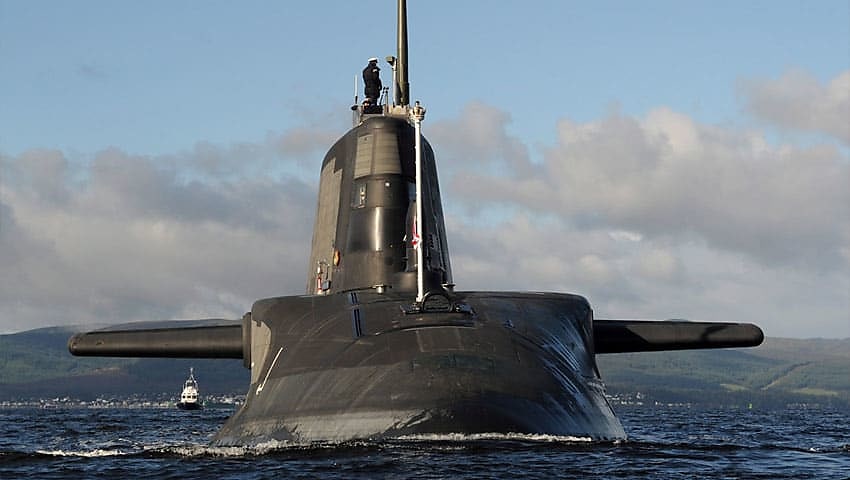Opinion: The AUKUS trilateral security arrangement provides a unique opportunity to establish a broader defence security ecosystem and address Australia’s energy trilemma, writes Natasha Poole.
To continue reading the rest of this article, please log in.
Create free account to get unlimited news articles and more!
Nuclear submarines have been a game changer in defence since the Cold War. They are the only form of naval vessel which can travel undetected by radar and can remain submerged and unnoticed at sea for extended periods of time. In contrast to diesel submarines, which are more easily detected due to the larger amount of noise they produce and the fact that they require regular surfacing for refuelling, nuclear submarines are able to spend months at a time submerged, due to the fact that they are powered by nuclear reactors. Their time spent at sea simply depends on the endurance and experience of the crew and, above all else, the amount of food they are able to carry on them.
Australia, as one might expect, has a comparatively small defence budget relative to the US and to China, the two countries with the largest defence budgets in the world. Nevertheless, Australia is also one of the largest countries in its nearby geographical vicinity, both in Australasia and in the South Pacific. The vast amount of ocean which surrounds its shores naturally lends itself to nuclear submarine technology over additional diesel technology. Diesel submarines simply cannot travel the distances required to cover the country in the shorter periods of time that nuclear submarines can.
Nuclear submarines seem to me to be a wise choice for the Australian Defence Force and why would the ADF not outsource the acquisition of them as part of the AUKUS agreement to the experts in nuclear energy, nuclear technology and defence in the UK and the US, as part of the opportunity which AUKUS presents?
Two per cent of Australia’s GDP is currently spent on defence, in comparison to the US’, of which 3.5 per cent is spent on defence. The latter also includes the funding which the US provides to other western countries’ defence alliances and organisations, such as NATO, and resultingly, the US’ annual defence budget is approximately US$700 billion.
New Zealand is a nuclear free country, geographically exposed and out on a limb. The country has spent equal to or less than 1.5 per cent of its GDP on defence over the past 10 years. The New Zealand government would most likely expect the US military to intervene should a military confrontation occur in the Pacific during the next 50-100 years.
Consequently, New Zealand perhaps ought to consider consolidating its defence relations with the US, UK and Australia’s defence forces. This could be achieved by New Zealand offering a contribution to AUKUS in return for the New Zealand defence force participating in mixed crewing opportunities with Australian Forces, similar to those recently presented in the deployment of a fleet of UK submarines to Australia.
Training practice is not only crucial during peacetime for any defence force, but it also serves to consolidate agreements and increase impetus within defence as a whole.
Given that Australia has minimal experience of both nuclear technology and nuclear energy, it seems to me to be costly and impractical to build nuclear submarines here in Australia. In fact, I would argue that, initially, it could be considered unwise to build them in their entirety.
Perhaps we ought to be looking at nuclear power as a more cost-effective alternative to green energy sources, which have proven to be costly and unreliable for Australians. Doing so would also serve as an opportunity for the country to familiarise itself with nuclear technology, allowing Australia to place itself in a position to support and service nuclear-powered equipment in defence, with the hands-on experience and fully regarded safety considerations that any form of nuclear power or technology requires.
Pushing to have Australia’s first two nuclear submarines by the early 2030s seems a most proactive and appealing an option. Delays are almost always inevitable in any major project, yet, pushing to achieve a worthwhile target seems to present no harm and is actually more often than not a better approach than accepting delays and adding to them ... Why would we choose to spend time and money changing the design of the US submarines when we have far less experience with nuclear technology and with nuclear submarines in comparison to the US and British Defence Forces, which have been using them for decades?
Australia has been continually involved with the US and British defence forces in training and operations programs since World War II. Existing ties are important in defence strategy as are previous military operations to date. The US, UK and Australia also share similar values and views on global security. The agreement is mutually beneficial to all involved.
With a transition towards cleaner energy being the preference of many and with Australia being under pressure from the rest of the world to reach net zero targets, cleaner fuel sources in the context of defence also appear to be a prudent option, with nuclear submarines offering long-term clean energy, faster transport, a 35-year reactor core lifetime, joint operations exercises with the US and UK, and the opportunity to learn from the experts in nuclear energy in the US and UK. Budgeting for both defence and energy policies does not appear to be mutually exclusive under this approach.
AUKUS could similarly provide an opportunity for New Zealand’s Defence Force to strengthen its position within the Pacific and prove its presence within the Five Eyes more proactively than we have “seen” of late.
AUKUS is simply an opportunity that ought to be entered into and made the most of…
Carpe diem.
Written by Natasha Poole, BA and MA Hons Litterae Humaniores, University of Oxford.

 Login
Login







